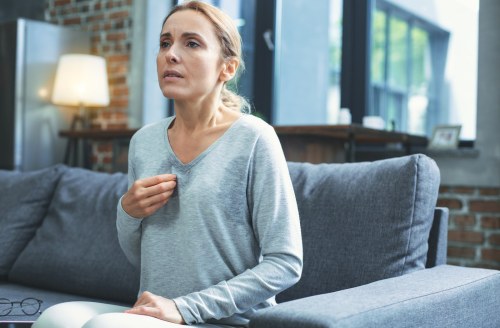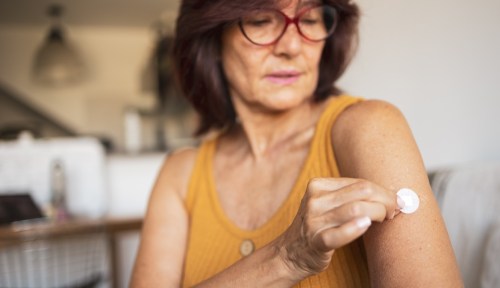Our editors independently select these products. Making a purchase through our links may earn Well+Good a commission
You know that famous expression about porn—how you know it when you see it? The same can probably be said for hot flashes because as any menopausal or perimenopausal person would tell you, you know when you’re having one.
“As a 52-year-old friend said to me recently, it’s like there’s an oven on inside of you,” explains Aviva Romm, MD, author of The Adrenal Thyroid Revolution. “A hot flash can come on as a slow roll of heat from the inside out, or it might start at your head and work downwards, or the other way around.” Fun!
For some women, hot flashes can be mild. For others, they’re so uncomfortable that it makes them want to jump out of their skin. “The sensation can last for seconds or persist for several minutes, and may be accompanied by sweating and then feeling cold after as the sweat evaporates and you cool down,” says Dr. Romm.
Hot flashes are one of the most common side effects of menopause. Unfortunately, you can still get them for years after menopause ends, which is just great. Luckily, there’s a lot you can do to regulate symptoms, says Dr. Romm. Here’s what you need to know.
First of all, what causes hot flashes?
From a physiological perspective, hot flashes are caused by a decline of estrogen in the body, which naturally occurs as women age (cough menopause cough). Not every person who goes through menopause has hot flashes, but they’re pretty common. And their intensity can vary depending on your hormonal levels, says Dr. Romm. “Women with more severe hot flashes typically have more estrogen dysregulation than those with mild flashes,” she says. “This is often accompanied by other menopausal symptoms like decreased sex drive and vaginal dryness, but not always.”
Stress can also worsen the symptoms of hot flashes, which is basically just a horrible Catch-22 situation. As anyone who’s ever felt stressed about how hot and sweaty they are knows, the stress typically makes the heat and sweating worse. “The flash isn’t noticeable to anyone else, but the sweating might be,” explains Dr. Romm. “So then you feel self-conscious, and boom—vicious cycle.”
Another thing that could worsen hot flash symptoms? Spicy foods. (Sorry, curry lovers!) Since they naturally generate heat in the body, hot flash symptoms could get worse as you pile on the pepper and hot sauce. Alcohol can be another trigger, so moderating your drinking may be a good idea during peri-menopause and menopause if your flashes are particularly bad.
How to find hot flash relief ASAP
Now you know the symptoms and triggers of hot flashes—and you know what makes them worse—here are some home remedies that can make the whole thing a little more bearable.
1. Dress in cool layers
Dr. Romm suggests starting with the basics and dressing with your hot flashes in mind. “Dressing in layers of natural fiber fabrics, rather than in a heavy sweater or long sleeve silk blouse and jacket, can keep you cooler,” she says. “Choose a tank top as your lowest layer to help you avoid the pit stains—just take off your layers when you feel that flash coming on!”
2. Tweak your bedroom environment
The same thing goes for your sleeping conditions. Make sure the temperature in your bedroom is cool, and make sure your bedding is made with cool, natural fibers that won’t cause you to overheat. And hey, there’s certainly nothing wrong with sleeping naked!
3. Try herbs
For a more specific remedy, Dr. Romm recommends a particular blend of herbs. “For hot flashes, I suggest black cohosh, hops, St. John’s wort, and valerian, taken as a tincture or in capsules,” she says. Just be sure to talk it over with your doctor first to ensure that the herbs don’t interfere with any medications you’re taking (St. John’s wort, for example, can interfere with some antidepressants). Don’t expect to see results overnight, either. “It takes 6-12 weeks to see benefits, so you have to be patient!” says Dr. Romm.
4. Consider acupuncture
Acupuncture has been shown to help with lots of symptoms of menopause, including hot flashes. “Patients come in complaining of intense heat over the face, neck, chest, and also mention profusely sweating at night,” says Windy Zhong, DACOM, a licensed acupuncturist with Apex Acupuncture in New York City. “The way we treat each case varies from patient to patient, but generally speaking, acupuncture is used to generate blood flow so that it does not become ‘stuck,'” she says—which she says can cause hot flashes.
5. Try meditating
True, it seems like mindfulness is the answer to everything…but in the case of hot flashes and other menopause symptoms, it could be pretty legit. A small 2011 study found that women who engaged in mindfulness training experienced less discomfort and stress from their menopause symptoms (like hot flashes), and felt those improvements over the course of three months. A larger study also found that women who had more of a mindfulness practice were less stressed, which correlated with fewer menopause symptoms.
When to see your doctor
Of course, your doctor is always a great resource for coping with hot flashes. If you’ve tried all of the above and nothing’s helping, your doctor can help you find other options that could work for you, including hormone therapy medication. (Although it should be noted that hormone therapy comes with risks like blood clots, breast cancer, stroke, and heart attack.) “It’s important to work with a practitioner not only in treating your flashes, but to rebalance your hormones and health,” Dr. Romm says.
There’s no question that hot flashes are unpleasant. But with the right tools and tactics, you’ll hopefully see improvements that make you a lot more comfortable and—dare we say—have more chill.
This piece was originally published on January 22, 2019. It was updated on February 20, 2019.
Want to learn more about menopause? Check out these foods that can slow down—or speed up—the process. And here are some essential oils that can help with menopause symptoms.
Sign Up for Our Daily Newsletter
Get all the latest in wellness, trends, food, fitness, beauty, and more delivered right to your inbox.
Got it, you've been added to our email list.











